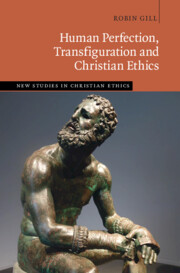Book contents
- Human Perfection, Transfiguration and Christian Ethics
- Reviews
- New Studies in Christian Ethics
- Human Perfection, Transfiguration and Christian Ethics
- Copyright page
- Contents
- Acknowledgements
- Introduction
- Part I Human Perfection
- Part II Jesus’ Perfection
- Part III Transfiguration and Global Perfection
- Select Bibliography in Christian Ethics
- Index
- Titles Published in the Series (continued from page )
- References
Introduction
Published online by Cambridge University Press: 09 May 2024
- Human Perfection, Transfiguration and Christian Ethics
- Reviews
- New Studies in Christian Ethics
- Human Perfection, Transfiguration and Christian Ethics
- Copyright page
- Contents
- Acknowledgements
- Introduction
- Part I Human Perfection
- Part II Jesus’ Perfection
- Part III Transfiguration and Global Perfection
- Select Bibliography in Christian Ethics
- Index
- Titles Published in the Series (continued from page )
- References
Summary
The introduction looks at the different ways that the unique, but troublesome, injunction at the heart of the Sermon on the Mount for the followers of Jesus to ‘Be perfect, therefore, as your heavenly Father is perfect’ (Matt. 5.48) has been interpreted within Christian history. It looks specifically at the interpretations of John and Charles Wesley, John Calvin, Thomas Aquinas, Augustine of Hippo, Gregory of Nyssa and Tertullian and argues that Aquinas’ is the most sophisticated. It suggests how each reflects the influence of their particular social contexts and their radically different theological takes on humanity, while holding in common a clear distinction between human and divine perfection.
Keywords
Information
- Type
- Chapter
- Information
- Publisher: Cambridge University PressPrint publication year: 2024
